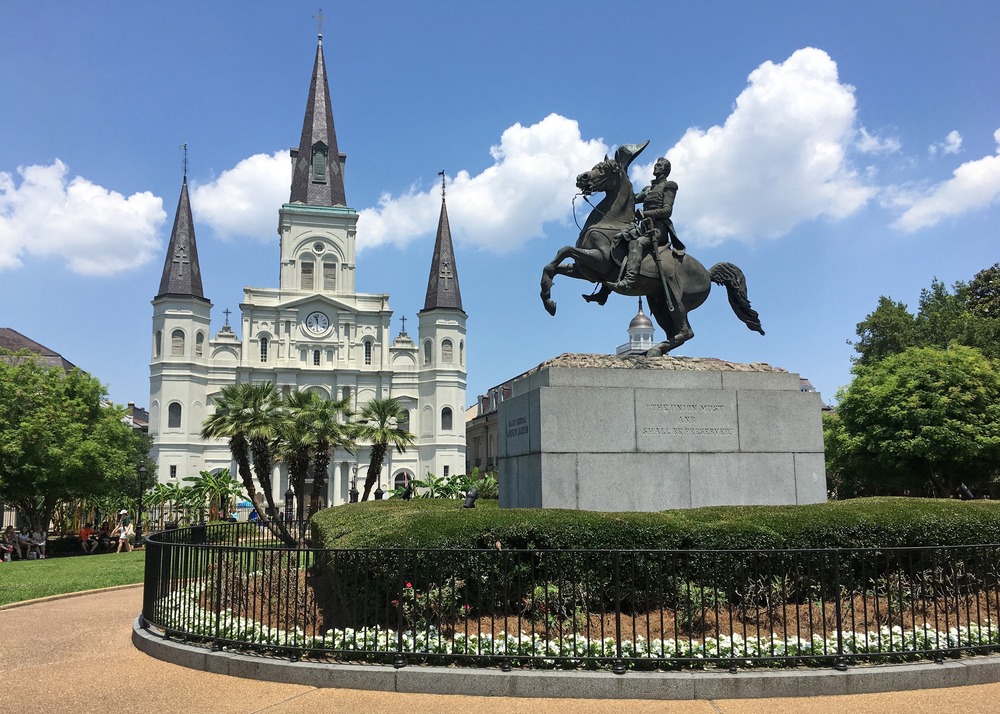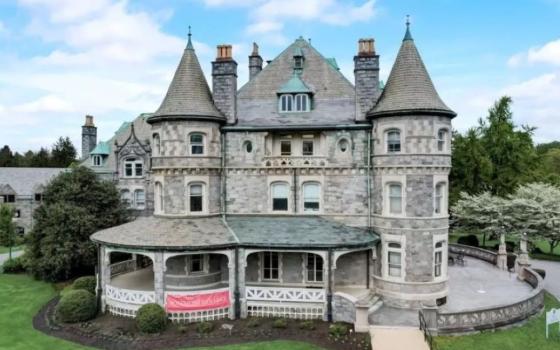
The St. Louis Cathedral and a statue of Andrew Jackson are seen in New Orleans June 3, 2019. The Louisiana Supreme Court has agreed to reconsider — upon request by the state's attorney general — whether it correctly decided the constitutionality of the state's look back provision that would have allowed sex abuse cases time-barred by the statute of limitations to proceed. (OSV News/Gregory A. Shemitz)
Louisiana's top court will reconsider its recent decision to scrap a "look back law" for abuse survivors — a move that could have a profound impact on several Catholic dioceses in the state that are already grappling with significant legal settlements and ongoing investigations.
On May 10, the Louisiana Supreme Court granted a rehearing on a March ruling that had overturned a 2021 "look back law," which gave victims of child sexual abuse until June 14 of this year to file civil claims. Senate Bill 246 would seek to extend that deadline until June 14, 2027.
The court's 4-3 March ruling had found that law was at odds with the state constitution's due process, prompting dismay from abuse survivors and advocates, and a filing for a rehearing from state attorney general Liz Murrill.
Murrill, a Republican, called the Supreme Court's decision to grant a hearing a "victory for child victims of sexual abuse."
"This was the right decision — as the bill passed unanimously through the State Legislature and should be the law here in Louisiana," she said. "I'll always defend victims of sexual abuse, and I look forward to the next steps at the Louisiana Supreme Court."
Two of the associate judges who had initially sided against the law — Scott Crichton and Piper Griffin — voted last week in favor of the rehearing.
The parties have through May 20 to file supplemental briefs.
The plaintiffs in the case — Douglas Bienvenu and several other complainants — filed suit in 2018 against the Diocese of Lafayette, Louisiana, and St. Martin de Tours Catholic Church in St. Martinville, Louisiana, alleging they were sexually abused between 1971 and 1979 by Father Kenneth Morvant while they were altar servers at the parish. According to the plaintiffs, Morvant had plied the boys — who then ranged in age from 8 to 14 — with alcohol and gifts during "sleepovers" at the rectory before molesting them.
Morvant died in 2003 at age 72, having served at several Diocese of Lafayette parishes over some four decades. He is buried on the grounds of St. Martin de Tours.
Lawyers for the Diocese of Lafayette, which had requested the decision the high court is now reconsidering, have held that the look back law is unconstitutional, as it violates the diocese's right not to be sued after the initial deadline for a suit had passed.
However, the law's chief sponsor, Rep. Jason Hughes, D-New Orleans, said when introducing the bill that victims of child sexual abuse typically do not disclose their trauma until about the age of 52, a statistic cited by the Philadelphia-based nonprofit Child USA.
Among the state's Catholic dioceses, the rehearing request stands to affect in particular the Archdiocese of New Orleans.
Advertisement
On April 25, Louisiana State Police executed a comprehensive search warrant on the archdiocese for documents related to a widening investigation into how the archdiocese has handled allegations of abuse.
The warrant cites potential violation of the felony of "trafficking of children for sexual purposes" as the reason for its sweeping access to archdiocesan records.
Probable cause for the warrant was based on the testimony of law enforcement official Scott Rodrigue, a state police investigator also assigned to the FBI's Violent Crimes Against Children Task Force.
Rodrigue stated in the warrant that in February 2022 he "began assisting the FBI after multiple allegations against members of the (Archdiocese) of New Orleans were made."
In June 2022, investigators interviewed a victim of Msgr. Lawrence Hecker, now 92, who was indicted by a grand jury in September 2023 for aggravated rape, aggravated kidnapping, aggravated crime against nature and theft. According to New Orleans Police Department reports, Hecker — who was clinically diagnosed as a pedophile under archdiocesan-ordered treatment — raped and kidnapped the unnamed victim between Jan. 1, 1975, and Dec. 31, 1976.
The inquiry into Hecker, along with "victim interviews and documents previously sealed by a federal bankruptcy judge," led investigators to suspect that "high-ranking members" of the archdiocese knew and ignored or actively covered up "claims of widespread sexual abuse of minors dating back decades," said Rodrigue.
A spokesperson with the Archdiocese of New Orleans told OSV News May 1 that the archdiocese "has been openly discussing the topic of sex abuse for over 20 years. In keeping with this, we also are committed to working with law enforcement in these endeavors."
Louisiana State Police Trooper Jacob Pucheu, public information officer, previously confirmed to OSV News "the Archdiocese is fully cooperating with the investigators and complying with the terms of the search warrant.
"At this time, it is still an ongoing investigation, and we do not have any further information to provide at this time," said Pucheu, who had told OSV News the April 25 search took place "during a meeting with representatives and counsel for the Archdiocese of New Orleans" and the state police's special victims unit investigators.
During more than eight hours of sworn testimony in 2020 — video of which was released May 10 by local television station WWLTV as part of an ongoing investigative collaboration with The Guardian — Hecker said that "it wasn't a big deal in those days" (referencing the 1960s and 1970s) to engage in child sexual abuse. He also admitted that several archdiocesan officials over the years were aware of his abuse, but that he was nonetheless named a monsignor and posted to pastoral assignments that placed him in contact with children.






